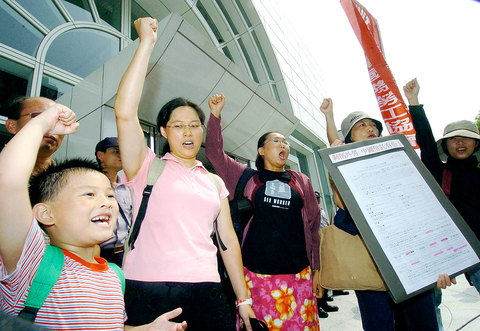Indonesian laborers and a human rights group protested yesterday in front of Chinatrust Commercial Bank's (
"Chinatrust imposes 19 percent interest rates on brokerage loans for the Indonesian laborers, which is as high as the rates for cash-advance cards," said Wu Jing-ru (
Currently, Indonesian workers are brought into Taiwan's job market under the "state-to-state importation" scheme, a system that involves the assistance of an embassy or representative office in Taiwan and its counterpart in the country of origin.

PHOTO: AFP
Under this system, Indonesians are required to pay a brokerage fee amounting to NT$49,787 (US$1,533), for taking out loans from the Chinatrust representative office in Indonesia, the Bank Chinatrust Indonesia, to come and work in Taiwan.
Including the 19 percent interest rate, processing fee and account management charge, these laborers will have to fork out a total of NT$70,545 (US$2,171) to pay off their loans, Wu said.
In response, Chinatrust said that the interest rates are imposed based on the situation in Indonesia, where banking institutions normally charge between 20 to 43 percent interest on consumer loans.
According to Jack Cheng (
"We are currently the only bank in charge of this loan operation, but we are not a monopoly as the Indonesian government is free to appoint other financial institutions as well," he said.
He added that further discussions between Chinatrust and Indonesian officials are under way.

Sweeping policy changes under US Secretary of Health and Human Services Robert F. Kennedy Jr are having a chilling effect on vaccine makers as anti-vaccine rhetoric has turned into concrete changes in inoculation schedules and recommendations, investors and executives said. The administration of US President Donald Trump has in the past year upended vaccine recommendations, with the country last month ending its longstanding guidance that all children receive inoculations against flu, hepatitis A and other diseases. The unprecedented changes have led to diminished vaccine usage, hurt the investment case for some biotechs, and created a drag that would likely dent revenues and

Global semiconductor stocks advanced yesterday, as comments by Nvidia Corp chief executive officer Jensen Huang (黃仁勳) at Davos, Switzerland, helped reinforce investor enthusiasm for artificial intelligence (AI). Samsung Electronics Co gained as much as 5 percent to an all-time high, helping drive South Korea’s benchmark KOSPI above 5,000 for the first time. That came after the Philadelphia Semiconductor Index rose more than 3 percent to a fresh record on Wednesday, with a boost from Nvidia. The gains came amid broad risk-on trade after US President Donald Trump withdrew his threat of tariffs on some European nations over backing for Greenland. Huang further

CULPRITS: Factors that affected the slip included falling global crude oil prices, wait-and-see consumer attitudes due to US tariffs and a different Lunar New Year holiday schedule Taiwan’s retail sales ended a nine-year growth streak last year, slipping 0.2 percent from a year earlier as uncertainty over US tariff policies affected demand for durable goods, data released on Friday by the Ministry of Economic Affairs showed. Last year’s retail sales totaled NT$4.84 trillion (US$153.27 billion), down about NT$9.5 billion, or 0.2 percent, from 2024. Despite the decline, the figure was still the second-highest annual sales total on record. Ministry statistics department deputy head Chen Yu-fang (陳玉芳) said sales of cars, motorcycles and related products, which accounted for 17.4 percent of total retail rales last year, fell NT$68.1 billion, or

MediaTek Inc (聯發科) shares yesterday notched their best two-day rally on record, as investors flock to the Taiwanese chip designer on excitement over its tie-up with Google. The Taipei-listed stock jumped 8.59 percent, capping a two-session surge of 19 percent and closing at a fresh all-time high of NT$1,770. That extended a two-month rally on growing awareness of MediaTek’s work on Google’s tensor processing units (TPUs), which are chips used in artificial intelligence (AI) applications. It also highlights how fund managers faced with single-stock limits on their holding of market titan Taiwan Semiconductor Manufacturing Co (TSMC, 台積電) are diversifying into other AI-related firms.